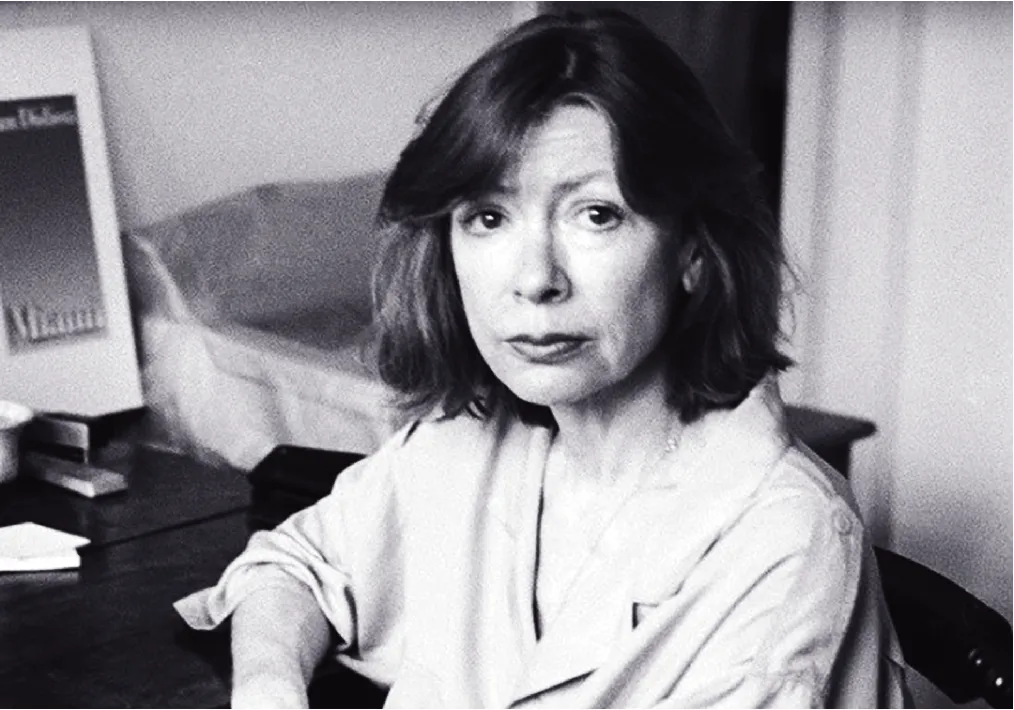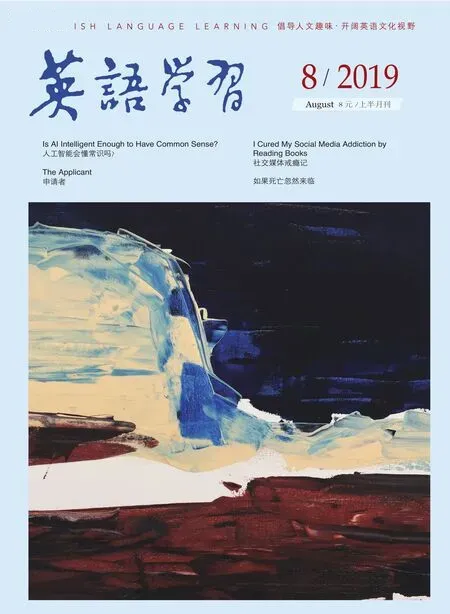如果死亡忽然来临
∷王伟滨

从没听说过这个名叫琼·迪迪翁(Joan Didion)的女人,只是偶然发现这本书,关于“死亡”,一个多少有些沉重的话题。这本《奇想之年》(The Year of Magical Thinking),被称作“悼亡文学”的巅峰之作。“悼亡”之作,我所熟悉的只有丁尼生(Lord Alfred Tennyson)献给早逝的大学挚友的挽歌集《悼念》(In Memoriam A. H. H.),以及哈代(Thomas Hardy)纪念亡妻的“埃玛组诗”。与那些相比,这本书就很不同了,书中没有多少关于往日“美好时光”的追述与怀念,没有关于死亡的哲思以及关于重生和天堂的遐想;有的只是造化的“无常”、面对“无常”我们的“不知所措”,以及我们学着去应对“无常”的种种徒劳的尝试。
2003年12月30日,人们都沉浸在圣诞的气氛中,迪迪翁和丈夫约翰有些烦心事——结婚不久的女儿昆塔纳(Quintana)突患急症,住进了ICU,情况不容乐观。夫妇二人刚从医院回来,讨论着是出去吃点儿东西,还是在家里自己做。生上壁炉的火,坐下,端起一杯威士忌,拿起一本书,从担忧中暂时抽离片刻。两人有一搭无一搭地谈上几句。忽然,丈夫不说话了,他的身体好像一下子停了工。
电话机旁当然有胶带黏着的救护车电话,那是以防万一的,以防“别人的”万一的。
救护车、医院、急救室、停尸房、表格……2004年。
迪迪翁就这样开始了她的“奇想之年”。
根据《大英百科全书》,所谓“奇想”是指“the belief that one’s ideas, thoughts, actions, words, or use of symbols can in fluence the course of events in the material world. Magical thinking presumes a causal link between one’s inner, personal experience and the external physical world. Examples include beliefs that the movement of the Sun, Moon, and wind or the occurrence of rain can be in fluenced by one’s thoughts or by the manipulation of some type of symbolic representation of these physical phenomena.”(某种认为人的想法、念头、行为、语言或符号可以影响物质世界事态发展的信仰。奇想认为,人内部的私人体验与外部的物质世界之间有着某种因果联系。例如,日、月、风或雨的发生都可能会受到人的想法或是某种代表物质世界现象的符号操纵的影响。)
像迪迪翁这样的知识女性,面对“无常”是不会“简单粗暴”地号啕大哭的。她冷静地处理着一切,理智地梳理着自己的思绪……然而,不管你曾设想了何种“得体”的方式,死亡,毕竟是死亡。悲伤,不管你怎样千万遍地作好准备,当它到来时,你仍然无法招架。也许,某些为了“悲伤”而设置的仪式,比如葬礼,能让你理所当然地宣泄一番,但葬礼之后的日子,当与你一同悲痛的人散去了,你又将陷入更深的悲痛。“We have no way of knowing that the funeral itself will be anodyne, a kind of narcotic regression in which we are wrapped in the care of others and the gravity and meaning of the occasion. Nor can we know ahead of the fact (and here lies the heart of the difference between grief as we imagine it and grief as it is) the unending absence that follows, the void, the very opposite of meaning, the relentless succession of moments during which we will confront the experience of meaninglessness itself.”(我们不知道,其实葬礼是一剂止痛药,是在这个庄严、肃穆的场合里,在众人关怀的包裹下的一剂麻醉针。我们事先也不知道,这之后会有无尽的空虚、空白——“意义”的反面——以及我们反复面对虚无的无尽时刻。这正是我们设想的悲痛与真实的悲痛之间的区别。)
迪迪翁是个极为理性的人,与“奇想”原本毫无瓜葛。“As a child I thought a great deal about meaninglessness, which seemed at the time the most prominent negative feature on the horizon.”(小时候的我总爱思考“虚无”这个题目;那时,“虚无”在我看来,就是人生中最大的“负面”因素。)她所做的一切,大抵都是在对抗“虚无”这码事:从学术到信仰,到爱情,再到家庭生活,所有一切都指向虚无的反面——“意义”。“After I married and had a child. I learned to find equal meaning in the repeated rituals of domestic life. Setting the table.Lighting the candles. Building the fire. Cooking. All those souf flés, all that crème caramel, and all those daubes and albondigas and gumbos. Clean sheets, stacks of clean towels, hurricane lamps for storms, enough water and food to see us through whatever geological event came our way. ”(结婚。生孩子。我学会在家庭生活日复一日的仪式中发现同样的“意义”。布置餐桌。点燃蜡烛。生起炉火。做饭。蛋奶酥、焦糖布丁、炖肉、肉丸、秋葵汤。干净床单、一叠一叠的干净毛巾、暴风天里要用的防风灯、应对任何地质事件的充足的水和食物。)这“日复一日”,这充足的“准备”,都是对“意义”的肯定,对“恒常”的礼赞。
但是,丈夫的忽然离世,无疑在她头脑中掀起了一场暴风,摧毁了所有“秩序”和“理性”的幻象,也摧毁了所有“意义”:“This is my attempt to make sense of the period that followed, weeks and then months that cut loose any fixed idea I had ever had about death, about illness,about probability and luck, about good fortune and bad,about marriage and children and memory, about grief, about the ways in which people do and do not deal with the fact that life ends, about the shallowness of sanity, about life itself.”(丈夫去世后的那段时间,几个星期,继而几个月,把我曾固守的关于死亡、疾病、可能性和运气、好运或歹运、婚姻、孩子、记忆、悲伤、关于生命终将结束的事实人们能应对或是无法应对、理性的浅薄,以及生命本身的种种想法统统打碎。而这本书,就是我想阐释那段时间的一种尝试。)
迪迪翁夫妇同为作家,家就是工作室,几十年来两人形影不离,已经习惯了“我们”这个称呼,而不知道“我”是什么了。实际上,许多时候两人的文学创作也的确是我中有你,你中有我。丈夫的突然离去,对琼来说,是无法想象的“灾难”;相比之下,女儿的重病反而不算什么了——至少,她有足够的时间去适应……
渐渐地,她的思想开始“奇妙”起来。
我们往往不相信,世间之事,真的是“无常”两个字可以概括,而总要去回想,回想那些早已出现,却被我们忽视的“征兆”和“警告”。“Survivors look back and see omens,messages they missed. They remember the tree that died,the gull that splattered onto the hood of the car. They live by symbols. They read meaning into the barrage(火力攻击)of spam on the unused computer, the delete key that stops working, the imagined abandonment in the decision to replace it.”(灾难之后,幸存者回首过去,总能看到那些被他们忽略的先兆、信息。他们记得,那棵死去的树,那只撞向汽车引擎盖的海鸥。他们靠符号活着。他们在种种事件中读出深意:许久不用的电脑里涌入大量垃圾邮件、删除键失灵、曾想着要替换那键盘却又放弃。)
面对死亡,或者任何“灾难”,也许我们都会产生所谓“appointment in Samarra”*萨马拉之约:巴格达一商人之仆,在市场上受到“死神”威胁,于是他赶紧去向商人借了一匹马,要急速逃到遥远的萨马拉去避祸。仆人走后,商人赶到市场,去质问那所谓的“死神”。“死神”—— 一个着黑衣的女人——说,她并没有威胁那仆人,她只是吃惊,二人原本当晚在萨马拉有个约会,这般时分,他为何还在巴格达。此为古老民间传说,后被毛姆改写为短篇小说。(萨马拉之约)这样的思考?如果我们能够读懂那些“先兆”,如果当初没有作出某个选择,是否就不会出现某种结果?因而就不会出现某种最终情况?生活中充满了这样的“迷局”,可惜没有人能够给你解释,那些“如果”会不会导向某个更好的结果。
其实,哪里有什么“预兆”呢?“灾难”只是“平常”的一部分。这“平常”,才体现了死亡乃至生命的残酷。“It was in fact the ordinary nature of everything preceding the event that prevented me from truly believing it had happened, absorbing it, incorporating it, getting past it. ... Confronted with sudden disaster we all focus on how unremarkable the circumstances were in which the unthinkable occurred, the clear blue sky from which the plane fell, the routine errand that ended on the shoulder with car in flames, the swings where the children were playing as usual when the rattlesnake struck from the ivy.”(实际上,正是丈夫去世前的每件事的平常性,让我无法真正相信它已经发生,接纳它、承受它、让它过去……面对突如其来的灾难,我们总关注到那无法想象的事件发生时环境的平常无奇:飞机坠毁时的碧蓝天空,汽车烧毁前的日常琐事,响尾蛇从藤蔓中突然袭来时孩子们平时玩的秋千。)
当然还有“时间”,我们或许可以在“时间”上做些什么吧。如果回到某个时间点上,是不是丈夫还在那里?是不是不去看那不想看到的事情,那事情就不会发生?“One day when I was talking on the telephone in his of fice I mindlessly turned the pages of the dictionary that he had always left open on the table by the desk. When I realized what I had done I was stricken: What word had he last looked up, what had he been thinking? By turning the pages had I lost the message? Or had the message been lost before I touched the dictionary? Had I refused to hear the message?”(某天,我在他的办公室打电话,无意间翻动了他书桌旁台子上那本他翻开的词典。当意识到我干了什么的时候,我大受触动:他当时在查什么词,又在想什么呢?我翻动了书页,是不是就丢失了他留下的信息?抑或在我碰那本词典之前,那信息就早已经溜走了?我是不是故意不去理会那个信息?)

琼·迪迪翁
……
“You had to feel the swell change. You had to go with the change. He told me that.”(你要感受到海浪的变化。你要随之而变化。约翰是这样告诉我的。)不管思想有多么奇妙,外部的世界依然故我。也许,那些曾经的“意义”、“秩序”和“理性”都不过是“奇想”的一部分吧。“无常”才是“恒常”。
据说,佛祖是因为看到“生老病死”的痛苦而决定修行,以寻求脱离痛苦之道。在黑塞的小说《悉达多》中,那个与佛祖同名的悉达多,经历了人生中诸般快乐与苦难,最后去河边做了个船夫,面对世人的种种困惑,他可以释然地说,“This does not trouble me much.”(这并不会让我多么苦恼。)然而,人又怎么可能真的超越痛苦、脱离痛苦呢?这“奇想”的一年,虽然痛苦,但却如此亲切,不过,慢慢地,哪怕是最深切的痛苦,总要淡化,最终消散。
“I realize as I write this that I do not want to finish this account. Nor did I want to finish the year.The craziness is receding but no clarity is taking its place. I look for resolution but find none. I did not want to finish the year because I know that as the days pass, as January becomes February and February becomes summer, certain things will
happen. My image of John at the instant of his death will become less immediate, less raw. It will become something that happened in another year. My sense of John himself, John alive, will become more remote,even ‘mudgy,’ softened, transmuted into whatever
best serves my life without him. In fact this is already beginning to happen.”(当我写下这些文字时,我知道自己不想结束这段讲述,也不愿结束这一年。“疯狂”在减退,但并没有“明晰”来代替它。我寻求解决之道,却一无所获。我不愿结束这一年,因为我知道,随着时日流转,一月变成二月,二月变成夏天,某些事就会发生。约翰离世那一刻的形象在我的脑海中就会淡化,就不那么痛切,就会变成另一年发生的事。约翰,活着的约翰,对我来说就会变得更加遥远,甚至模糊、弱化,变得让我更容易接受没有他的生活。实际上,这已经在发生了。)
所谓的“奇想”,最终当然并不能改变那已经发生和将要发生的,丈夫终将渐渐远去。琼的女儿也在经历了短暂康复之后再次入院,并在不久后离世。
这世上又少了一个和琼一起“奇想”的人。

